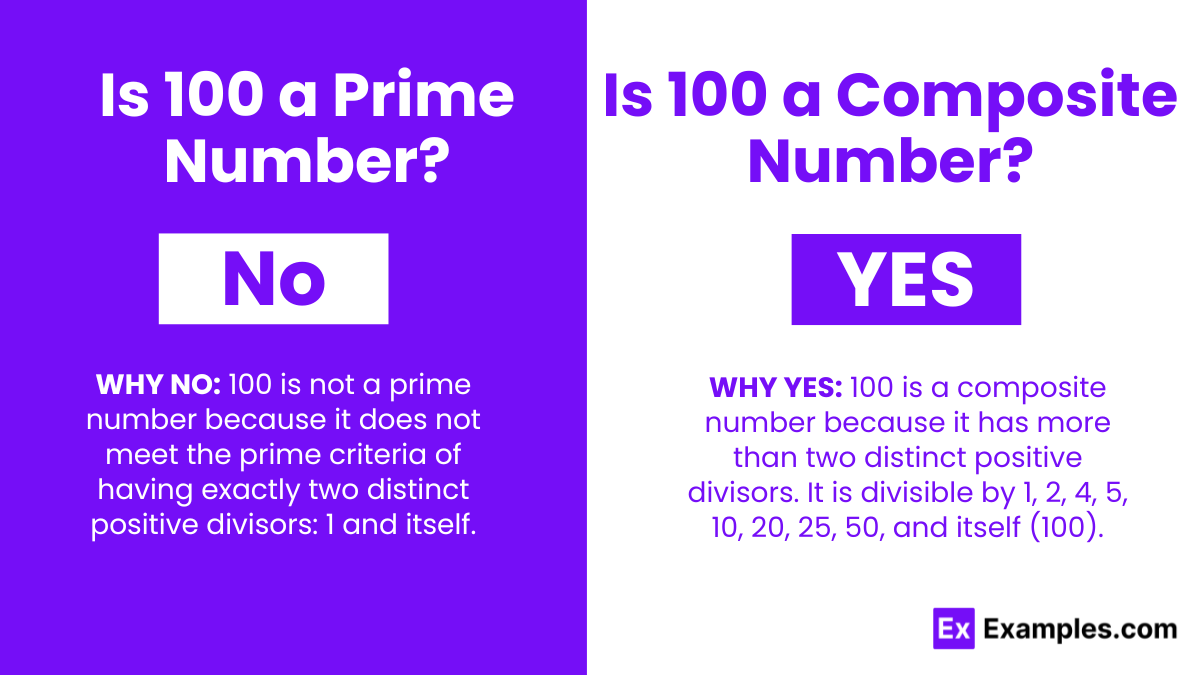Is 100 a prime number?
Yes
No
Only if it is less than 100
Cannot be determined

Why No: 100 is not a prime number because it does not meet the prime criteria of having exactly two distinct positive divisors: 1 and itself. Check if any number is prime or not
Why Yes: 100 is a composite number because it has more than two distinct positive divisors. It is divisible by 1, 2, 4, 5, 10, 20, 25, 50, and itself (100).
| Property | Answer |
|---|---|
| Is 100 a prime number? | No |
| Is 100 a composite number? | Yes |
| Is 100 a perfect square? | Yes (10×10) |
| Factors of 100 | 1, 2, 4, 5, 10, 20, 25, 50, 100 |
| Multiples of 100 | 100, 200, 300, 400, 500, 600, 700, 800, 900, 1000 |
| Cube Root of 100 | 4.642 |
| Square of 100 | 10000 |
| Square Root of 100 | 10 |
| Is 100 a Perfect Cube? | No |
| Is 100 an Irrational number | No |
| Is 100 a Rational number | Yes |
| Is 100 a Real number | Yes |
| Is 100 an Integer | Yes |
| Is 100 a Natural number | Yes |
| Is 100 a Whole number | Yes |
| Is 100 an Even or odd number | Yes (100 is an even number) |
| Is 100 an Ordinal number | Yes |
| Is 100 a Complex number | Yes (as all real numbers are also complex numbers) |
The factors of 100 are 1, 2, 4, 5, 10, 20, 25, 50, and 100. 100 is not a prime number because it is divisible by numbers other than 1 and itself, demonstrating it has more than two factors. This clarity confirms that it is a composite number, not a prime number.
100 is categorized as a composite number because it has more than two distinct positive divisors: 1, 2, 4, 5, 10, 20, 25, 50, and itself.
The nearest prime numbers to 100 are 97 and 101. 97 is the closest prime number less than 100, and 101 is the closest prime number greater than 100
The negative pair factors of 100 are (-1, -100), (-2, -50), (-4, -25), (-5, -20), and (-10, -10).
The positive pair factors of 100 are (1, 100), (2, 50), (4, 25), (5, 20), and (10, 10).
The prime factorization of 100 is 22×5222×52, meaning 100 is composed of the primes 2 and 5.
Text prompt
Add Tone
10 Examples of Public speaking
20 Examples of Gas lighting
Is 100 a prime number?
Yes
No
Only if it is less than 100
Cannot be determined
Which of the following is a factor of 100?
15
25
35
45
What is the result of dividing 100 by 10?
5
10
20
50
Can 100 be expressed as the product of two smaller positive integers other than 1 and itself?
Yes
No
Only if one integer is 2
None of the above
What is the sum of the digits of 100?
1
10
100
11
Which number is a prime factor of 100?
2
4
10
20
What is the smallest prime factor of 100?
1
2
5
10
Which type of number is characterized by having more than two positive divisors?
Prime number
Composite number
Odd number
Even number
What happens to the divisibility of 100 when divided by 25?
It gives 4
It gives 2
It gives 1
It gives 0
Is the number 100 considered a composite number if it is divisible by 10?
Yes
No
Only if it is divisible by 100
None of the above
Before you leave, take our quick quiz to enhance your learning!

